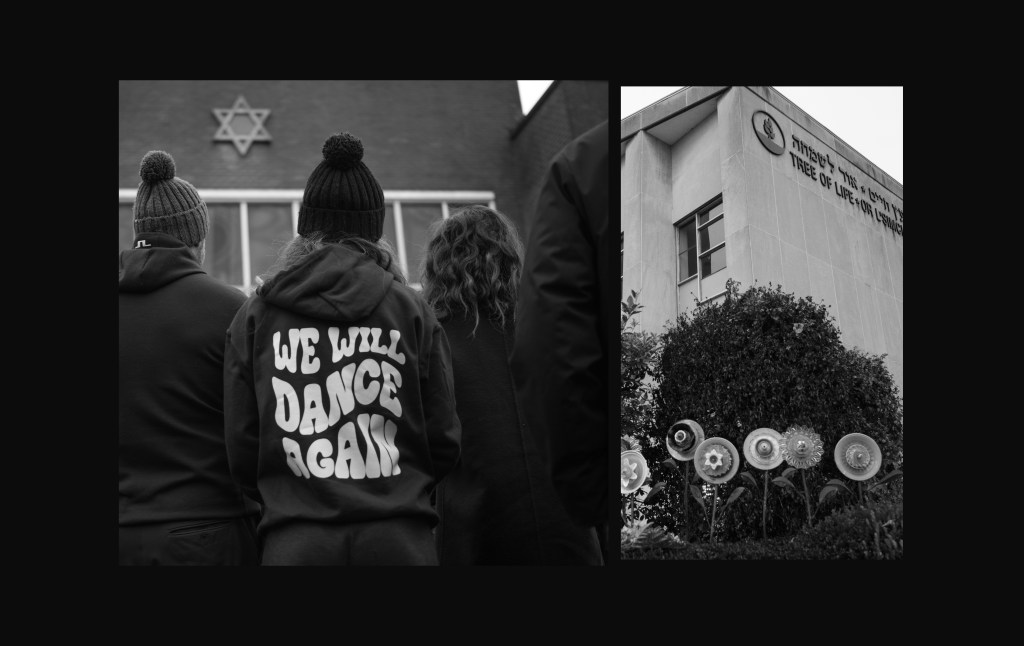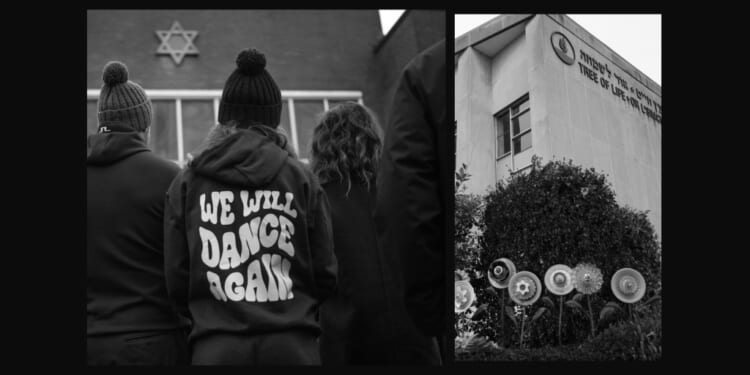
Terrorism follows the zeitgeist. Left-wing European terrorism in the 1970s—the Red Army Faction and the Revolutionary Cells—rose as the Marxist critique of Western capitalism and “American imperialism” gained strength. Behind the scenes, the Soviet empire’s intelligence services also helped. The social and intellectual milieu that birthed contemporary Islamic terrorism electrified from the 1950s to the 1990s as Middle Eastern regimes became increasingly harsh, modernizing autocracies. As the imported and invented national identities and aspirations faltered, an older one supercharged.
All of this is pertinent to thinking about whether rising antisemitism and skyrocketing anti-Zionism are gestating a new era of terrorism. The war in Gaza may have led to a tipping point. In the last year, Europe and the United States have each seen deadly attacks against Jews, doing what terrorism always does: amplify fear beyond the body count. And the background noise is alarming: In 2024, according to the Anti-Defamation League, 9,354 antisemitic incidents occurred, which represents a 5 percent increase from the 8,873 incidents recorded in 2023, a 344 percent increase over the past five years and an 893 percent increase over the past 10 years. “It is the highest number on record since ADL began tracking antisemitic incidents 46 years ago” and “for the first time in the history of the Audit, a majority (58%) of all incidents contained elements related to Israel or Zionism.”
The trend doesn’t appear to be reversing in 2025. In Western Europe in the last two years, antisemitic incidents have seen similar increases. Synagogues and other Jewish institutions in the West are now spending a lot of money on security. Jewish anxiety about the existential question of acceptance has become commonplace. Jewish concerns about the antisemitic impact of Muslim immigration have grown exponentially.
The good news: Despite the volcanic rhetoric coming out of the Muslim world against Israel and its supporters, we have yet to see well-known, non-Palestinian, radical outfits using Gaza as a war cry to successfully orchestrate terrorism against Israel or Jews. Al-Qaeda and the Islamic State, shattered and scattered into nasty, regional squabbles, have not so far gone global again. George W. Bush’s much-maligned “Global War on Terror,” continued by Barack Obama, shredded the capacity and reach of anti-Western terrorist organizations and introduced a mundane fact that Islamic radicals have spiritually had difficulty overcoming: battlefield defeat.
Al-Qaeda does have camps in Afghanistan once again, thanks to the new Taliban regime. Al-Qaeda’s current head, Saif al-Adel, remains faithful to his predecessors’ bay’a (an oath of allegiance) to the Taliban emir; the Taliban has reciprocated and given Al-Qaeda its own compounds. Adel’s Gaza-fed anger, delivered in a discursive, grievance-rich, Holocaust-denying declaration of war against the West and Israel, appears, for now, more aimed at the Muslim world—the traitors within—than at Zionist supporters abroad. But Adel clearly paints Americans, Europeans, and Israelis as targets: ”They are all Zionists.” He admits, however, that his side hasn’t been doing well. The West has smashed through Islam’s “frontlines.” The faithful need more “inspiration” and “education.” “Lone-wolf attacks,” though terrifying to Westerners and spiritually satisfying to believers, aren’t enough. More organized “martyrdom [suicide] operations” are needed.
While we don’t know who has responded to Adel’s call to believers to return to Afghanistan to train as jihadists, al-Qaeda is the one to watch for reorienting its philosophy and lethality toward, as bin Laden put it, “Jewish Crusaders.” The organization is resilient and, most importantly, has long-standing ties to Iran’s Islamic Revolutionary Guard Corps. Adel resided in Iran for years and may still be traveling back and forth as the need arises. The IRGC has had Israel and Jews on the brain since birth; the 12-Day War certainly highlighted that the only tool left in the Islamic Republic’s arsenal may be terrorism. Whether Tehran is willing to double down against Israel and “global Jewry” now, after the Israeli Air Force and intelligence killed so many regime VIPs, whether it even has the overseas capacity to orchestrate terrorism of any scale, is an open question.
The recent warning that London, Paris, Berlin, and Washington gave to Tehran about using criminals to effect kidnappings and assassinations within Europe and the United States certainly shows the clerical regime still wants to punish enemies. But it doesn’t show the Iranian theocracy is particularly good at it. Similar questions apply to the Lebanese Hezbollah, which has repeatedly gone after Jews outside of Israel. Counterterrorism experts have often described Hezbollah as Iran’s A-Team for dark operations. Given what has happened the last two years, and what hasn’t, these assessments may need to be revised.
For the brand names in Islamic terrorism, going full-throttle against the Jews would be a natural evolution and gel well with Western antisemites. But such an approach launched from the Middle East, aimed to recruit a Middle Eastern audience, assumes antisemitism and anti-Zionism have the kind of traction among Sunni and Shiite Muslims that anti-Western, especially anti-American, themes had in the 1990s and, for Shiites, in the 1970s. They may not.
Terrorism, like everything else, evolves. It’s quite possible that people in the Islamic Middle East, much of it impoverished and exhausted by authoritarian excess and sectarian conflict, aren’t going to get that animated by the continuing clash of Israelis and Palestinians, at least not enough to refuel global terrorism, even with all the images of desolation in Gaza. Western intelligence and security services will surely keep watching the usual suspects-–even if they don’t appear as scary as they once were.
It’s extremely hard to assess, for example, the sentiments of the Egyptian middle and lower classes in President Abdel Fattah el-Sisi’s police state. But the heartland of the Ikhwan, the Muslim Brotherhood, may be in no mood to send volunteers overseas. The ease with which the Egyptian army pulled off a coup against an elected Brotherhood government in 2013 suggests the spirit and capacity of the movement was far less vigorous than many feared.
The greatest terror threat toward ‘global Jewry’ in the coming years may not be Islamic. What’s happening in the West, especially in Europe, where the scorching left-wing criticisms of Israel are nearly indistinguishable from the damnations made by ardent Muslims, creates arguments for violence against Jews.
Born in 1987, the Islamic Resistance Movement, aka Hamas, was the most powerful offshoot of the Egyptian Ikhwan. Qatar has been a key financial backer of Hamas since 2006, but given the organization’s thrashing in Gaza, it’s doubtful that Qatar’s cash can find an equally consequential recipient. And in fact, the Al-Thani family may have more influence with the Trump family and its minions than it does with what’s left of radical Sunni Islam in the Middle East. Given how the Qataris came squealing to Washington when the Israelis tried to missile Hamas’ leadership in Doha, it’s a safe bet that the Al-Thanis don’t have the balls to back a clandestine terror campaign against Israel and “global Jewry.”
Just wanting to be troublesome, Qataris might throw more money at growing Muslim communities in Europe. But European Muslims, shell-shocked from the experience of what happened to those who left to join the Islamic State, have changed. Militant believers there seem, at least to European security officials who track them, less adventurous. Briefly enraptured by the Islamic State’s territorial conquests, hundreds died or were imprisoned in the Middle East and Europe. Anti-Zionist and anti-Jewish passions are obviously strong among them, and the convergence with the European left is frightening. The French novelist Houellebecq’s mordant, exaggerated depiction of the baleful Muslim impact on French politics isn’t without foundation.
But European security and intelligence services are vastly more attentive to Islamic radicalism than they were in the 1990s. Back then, Saudi-paid preachers could let loose fire-and-brimstone sermons against the West in unmonitored mosques. Mosques are now surveilled. Preemption, not patience, has become the rule. Foreign financial support to Muslim institutions within Europe is watched much more closely.
Far bolder than the Qataris is Turkish President Recep Tayyip Erdoğan. He admires the Muslim Brotherhood. He envisions himself as the leader of the Islamic world. Part of that ambition is leading the opposition to Israel. However, this passion hasn’t yet consumed him. International grandstanding, domestic oppression, bankrupting populist economics, architectural excess, fiery speeches against many domestic and foreign enemies, and small-scale foreign adventures are more his cup of tea. Despite his intense anti-Zionist and antisemitic rhetoric, he just doesn’t seem the type to back, even surreptitiously, a campaign of terrorism against Israelis, let alone “global Jewry.”
Nor does Ahmed al-Sharaa, the president of Syria and the former emir of the Sunni Islamist-jihadist conglomeration, Hay’at Tahrir al-Sham. Syria is and will likely remain a mess: Armed factionalism is the new national identity. It’s a place to watch given the high number of resident, battle-hardened jihadists from numerous countries. However, al-Sharaa is in discussion with Israel to normalize the border and relations. This likely won’t go anywhere. But that al-Sharaa, a former leader of al-Qaeda’s Nusra Front, would be having any talks, no matter how indirect, with the Jewish state is astonishing. Ditto for meetings with an American president. It’s not hard to envision some of al-Sharaa’s foot soldiers forming a new nucleus of a terrorist organization aimed at Jews and Israel. But Islamic organizations are top-down affairs. For the time being, leadership is going the other way, which probably reflects the desires of the vast majority of Syrians, who experienced carnage far worse than what happened in Gaza.
Further, the convulsions and the domestic terrorism unleashed against many Arab governments since 9/11 have changed calculations and tolerance toward Islamists. Saudi Arabia, chock-full of princes and militant preachers who helped to turn Islamic fundamentalism into a white-hot global movement from the 1970s into the 2000s, is now consumed with the 2030 Vision of Crown Prince Mohammed bin Salman, the de facto ruler of the country. A determined autocrat, MBS takes a dim view of Islamic radicals and freelancing princes and religious foundations funding militants at home or abroad. MBS’s modernization may produce a religious backlash, which could target the prince’s outreach to Jews and Israel, but that’s likely far down the road unless the prince’s grandiose ambitions crater the economy sooner.
That leaves, on the Sunni side, the Palestinians. Palestinian terrorism has always been eye-catching because it’s been an experiment in the fusion of holy war, with its deep roots in Islamic history, and the quintessentially Western ambition for a nation-state. Hamas has relentlessly focused on two things: replacing the PLO as “the sole legitimate representative of the Palestinian people”—a catechism blessed by the Arab League and the United Nations in 1974—and eliminating the Jewish state. As Islamist terrorists go, they are more “old-school.” We have not seen, at least not yet, Hamas members traveling the world to shoot up airports, plow trucks through Christmas markets, behead unbelievers, or blow up American embassies. Since October 7, 2023, European security services have stopped clumsy Hamas operations in Europe, some aimed at Jews and Israelis, some trying to acquire weaponry.
Hamas would surely love to travel the world killing Jews. The group so far lacks the capacity, especially the essential foreign networks. Iran could help. But the Islamic Republic, too, hasn’t shown itself as skilled as it once was beyond the Middle East.
It’s possible that if Israeli settlers and West Bank Palestinians clash more intensely, secular Palestinian groups who openly cheer when Israelis die might get recharged and gain more talented, peripatetic killers. The intellectual ecosystem is certainly there for such an evolution. It would be challenging, however, for secular Palestinian terrorists to sustain themselves overseas (with no KGB, Stasi, or Czech StB to help them). The Palestinian identity has been formed overwhelmingly in opposition to Jews. The principal reason for the longevity of the Israeli-Palestinian conflict is that the Palestinians, as a people, have refused to admit that they lost the war for the Holy Land. As long as enough Palestinians refuse to accept their defeat, then a wave of international terrorism aimed at Jews led by Palestinians remains a serious risk.
The Islamist internet is full of virulent anti-Zionism and Jew hatred with explicit calls for holy war. It would be a hard call today to know, however, whether the general, nondenominational online distaste for Jews and Israel does less to fuel attacks than any specific Muslim social-media effort to rally believers against Israel and its supporters. Islamo-gauchisme, or Islamo-leftism (think “Queers for Palestine”), has eroded the old intellectual lines that kept leftists far from any alignment with whom Christopher Hitchens called “Islamo-fascists,” aka Muslim fundamentalists. New York Mayor-elect Zohran Mamdani and Rep. Alexandria Ocasio-Cortez, who have both accused Israel of genocide, might not be antisemites. But if Israel committed genocide in Gaza, a charge also rather casually hurled on National Public Radio, the BBC, and Radio France Internationale, and most Jews still support Israel, then contempt for Jews becomes an expression of righteous indignation. There are no extenuating circumstances for genocide. It’s a pretty small step from Mamdani’s and AOC’s fraudulent accusations to seeing terrorism against Israelis as understandable if not estimable. Terrorism against Jews becomes, at a minimum, less reprehensible.
The American right is, naturally, less fashionably antisemitic. But the right has long had conspiracy-mongers whose criticisms of Israel routinely suggest that Jewish Americans have a greater loyalty to Zion than to America. Tucker Carlson now accuses “Christian Zionists” of essentially the same un-American activities. More hoary, more deadly, and definitely more bizarre is the anti-Israeli insinuation Carlson made eulogizing Charlie Kirk, echoing the ancient unforgivable “crime” first charged against the Jews by the early Church: deicide. In an America with rising “Christian nationalism,” the “Jews killed Christ” (or Kirk) storyline is toxic. Most evangelicals and Catholics appear to reject it. But in the fervid, conspiratorial world where Western, non-Muslim terrorists are made, a prominent right-wing voice condoning something that has been so injurious to Jews for more than 1,600 years can’t help but add fuel to the fire. In the West, among non-Muslims, antisemitism may have reached take-off velocity.
The greatest terror threat toward “global Jewry” in the coming years may not be Islamic. What’s happening in the West, especially in Europe, where the scorching left-wing criticisms of Israel are nearly indistinguishable from the damnations made by ardent Muslims, creates arguments for violence against Jews. And Western arguments always establish the dominant narrative: It was a French (Jewish) Marxist scholar, the brilliant Maxime Rodinson, who pioneered the idea of Israel as a “colonial-settler state.” Muslims later locked onto it, turning it into a clarion call for war. This cross-fertilizing miasma is devilishly difficult to combat on the ground, certainly beyond the capacity of European security services to dissipate. The self-actuating terrorist, operating outside a group, is damn hard to find and preempt. Jews need the larger society, both Gentile and Muslim, to discredit such deadly individualism. This threat now may be a greater menace to Jews than even Iran’s antisemitic derangement and yearning for revenge.
It’s hard to imagine things going back to a pre-Gaza “normal” for non-Israeli Jews. A better, though hardly satisfying future, would be that pro-Zionist Jews are just politely ghettoized by elite Western opinion while Islamo-gauchisme gradually fades because too many Muslims are just uncool. Such discrimination—hard to pull off in the U.S. given the dense presence of Jews in American culture and elite institutions—wouldn’t necessarily reinforce a taste for violence by hard-core antisemites and anti-Zionists. It would just leave Jews in an unpleasant limbo.

















